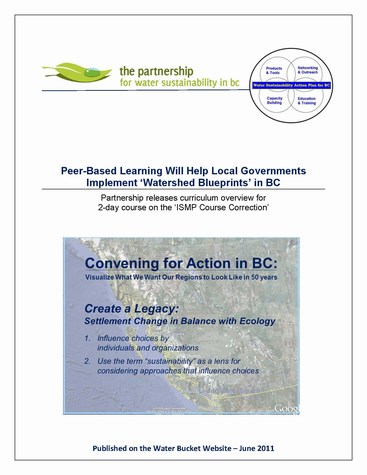Peer-Based Learning Will Help Local Governments Implement ‘Watershed Blueprints’ in BC
Note to Reader:
ISMP is the acronym for Integrated Stormwater Management Plan. In the late 1990s, the genesis for ISMPs was a desire by local governments to integrate the community, engineering, planning and environmental perspectives.
To fill a professional development need, the Partnership for Water Sustainability in British Columbia is offering a 2-day course titled ISMP Course Correction: Achieve More with Less. The City of Surrey will host the first course on November 9-10, 2011. The venue is the Surrey Art Centre.
To download a copy of the Curriculum Overview and to learn more about the course, click on Peer-Based Learning Will Help Local Governments Implement Watershed Blueprints in BC.
Paradigm-Shift: Will it be ‘A Report in Four Volumes’ or ‘A New Watershed’?
During the period November-December 2010, the Partnership for Water Sustainability released the 5-part ISMP Course Correction Series. This series integrated lessons learned by leading local governments when undertaking watershed-based planning. Release of the Summary Report for ISMP Course Correction Series followed in February 2011.
The image above illustrates the essence of the paradigm-shift for ISMPs: from model-centric to landscape-based (click on image to download a PDF copy).
Sustainable Service Delivery
 “The unfunded infrastructure liability confronting all local governments, combined with conditions imposed in May 2011 by the Minister of Environment in Metro Vancouver, are drivers for implementing the ‘course correction’. A desired outcome is Sustainable Service Delivery. To achieve this outcome, the spotlight is on a life-cycle way of thinking about infrastructure needs and how to pay for them,” reports Kim Stephens, Partnership Executive Director.
“The unfunded infrastructure liability confronting all local governments, combined with conditions imposed in May 2011 by the Minister of Environment in Metro Vancouver, are drivers for implementing the ‘course correction’. A desired outcome is Sustainable Service Delivery. To achieve this outcome, the spotlight is on a life-cycle way of thinking about infrastructure needs and how to pay for them,” reports Kim Stephens, Partnership Executive Director.
 “The Province is challenging local governments to think about what infrastructure asset management entails BEFORE an asset is built. The paradigm-shift starts with land use planning and determining what services can be provided sustainably, both fiscally and ecologically,” adds Glen Brown, Executive Director with the Ministry of Community, Sport and Cultural Development. His responsibilities encompass local government infrastructure and finance.
“The Province is challenging local governments to think about what infrastructure asset management entails BEFORE an asset is built. The paradigm-shift starts with land use planning and determining what services can be provided sustainably, both fiscally and ecologically,” adds Glen Brown, Executive Director with the Ministry of Community, Sport and Cultural Development. His responsibilities encompass local government infrastructure and finance.
To Learn More:
Click on Peer-Based Learning Will Help Local Governments Implement Watershed Blueprints in BC to download a copy of the Curriculum Overview and to learn more about the course.

Posted September 2011


